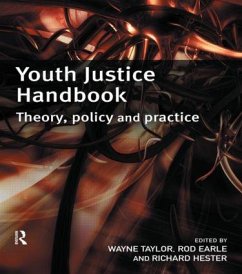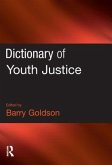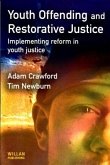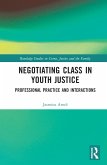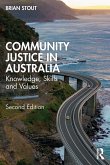Youth Justice Handbook
Theory, Policy and Practice
Herausgeber: Hester, Richard; Taylor, Wayne; Earle, Rod
Youth Justice Handbook
Theory, Policy and Practice
Herausgeber: Hester, Richard; Taylor, Wayne; Earle, Rod
- Broschiertes Buch
- Merkliste
- Auf die Merkliste
- Bewerten Bewerten
- Teilen
- Produkt teilen
- Produkterinnerung
- Produkterinnerung
This book provides an essential resource for both practitioners in youth justice as well as those who are studying the subject as part of their training or an academic course.
Andere Kunden interessierten sich auch für
![Dictionary of Youth Justice Dictionary of Youth Justice]() Dictionary of Youth Justice59,99 €
Dictionary of Youth Justice59,99 €![Alternatives to Prison Alternatives to Prison]() Alternatives to Prison73,99 €
Alternatives to Prison73,99 €![Understanding Criminal Justice Understanding Criminal Justice]() Azrini WahidinUnderstanding Criminal Justice64,99 €
Azrini WahidinUnderstanding Criminal Justice64,99 €![Key Themes in Health and Social Care Key Themes in Health and Social Care]() Key Themes in Health and Social Care30,99 €
Key Themes in Health and Social Care30,99 €![Youth Offending and Restorative Justice Youth Offending and Restorative Justice]() Adam Crawford (UK University of Leeds)Youth Offending and Restorative Justice61,99 €
Adam Crawford (UK University of Leeds)Youth Offending and Restorative Justice61,99 €![Negotiating Class in Youth Justice Negotiating Class in Youth Justice]() Jasmina ArnezNegotiating Class in Youth Justice200,99 €
Jasmina ArnezNegotiating Class in Youth Justice200,99 €![Community Justice in Australia Community Justice in Australia]() Brian StoutCommunity Justice in Australia31,99 €
Brian StoutCommunity Justice in Australia31,99 €-
-
-
This book provides an essential resource for both practitioners in youth justice as well as those who are studying the subject as part of their training or an academic course.
Hinweis: Dieser Artikel kann nur an eine deutsche Lieferadresse ausgeliefert werden.
Hinweis: Dieser Artikel kann nur an eine deutsche Lieferadresse ausgeliefert werden.
Produktdetails
- Produktdetails
- Verlag: Taylor & Francis Ltd
- Seitenzahl: 288
- Erscheinungstermin: 6. Oktober 2009
- Englisch
- Abmessung: 244mm x 172mm x 23mm
- Gewicht: 578g
- ISBN-13: 9781843927167
- ISBN-10: 1843927160
- Artikelnr.: 26858971
- Herstellerkennzeichnung
- Libri GmbH
- Europaallee 1
- 36244 Bad Hersfeld
- 06621 890
- Verlag: Taylor & Francis Ltd
- Seitenzahl: 288
- Erscheinungstermin: 6. Oktober 2009
- Englisch
- Abmessung: 244mm x 172mm x 23mm
- Gewicht: 578g
- ISBN-13: 9781843927167
- ISBN-10: 1843927160
- Artikelnr.: 26858971
- Herstellerkennzeichnung
- Libri GmbH
- Europaallee 1
- 36244 Bad Hersfeld
- 06621 890
Wayne Taylor works at HM Young Offenders Institute in Northumberland. Rod Earle is Lecturer in Youth Justice in the Faculty of Heath and Social Care at the Open University. Richard Hester is the Director of the Department of Health and Social Care at the Open University.
Introduction Part 1: Contexts of Childhood and Youth Introduction 1.
Structural Disadvantage: Youth, Class, Crime and Poverty 2. Transitions to
Adulthood 3. From Child to Adult: Theoretical Assumptions in Ideas about
Growing Up 4. Sex 'n' Drugs 'n' Rock 'n' Roll: Young People as Consumers 5.
Bullying as Abuse Part 2: Research, Knowledge and Evidence in Youth Justice
Introduction 6. Research-informed Youth Justice? 7. Whose Account Counts?
Politics and Research in Youth Justice 8. Globalisation, Power and
Knowledge in Youth Justice 9. Preventing and Reducing Risk 10. What Can we
Know, and How Can we Know it? Part 3: Policy, Possibilities and Penal
Realities in Youth Justice Introduction 11. Parenting and Youth Justice:
Policy and Practice 12. Restorative Justice at the Heart of the Youth
Community 13. Children and Young People in Custody 14. Living in a Box:
Ethnicity and Identity Inside a Young Men's Prison Part 4: Reflective
Practice Introduction 15. Promoting Desistance Amongst Young People 16.
Young People's 'Voices' as Evidence 17. Partnership: Putting Relationships
to Work 18. Reflective Practice in Youth Justice Part 5: Widening Contexts
Introduction 19. The United Nations, Children's Rights and Juvenile Justice
20. Human Rights and Youth Justice in Europe 21. Values in Youth Justice:
Practice Approaches to Welfare and Justice for Young People in UK
Jurisdictions 22. The Dragonisation of Youth Justice 23. The Development of
Restorative Justice in Northern Ireland, Conclusion
Structural Disadvantage: Youth, Class, Crime and Poverty 2. Transitions to
Adulthood 3. From Child to Adult: Theoretical Assumptions in Ideas about
Growing Up 4. Sex 'n' Drugs 'n' Rock 'n' Roll: Young People as Consumers 5.
Bullying as Abuse Part 2: Research, Knowledge and Evidence in Youth Justice
Introduction 6. Research-informed Youth Justice? 7. Whose Account Counts?
Politics and Research in Youth Justice 8. Globalisation, Power and
Knowledge in Youth Justice 9. Preventing and Reducing Risk 10. What Can we
Know, and How Can we Know it? Part 3: Policy, Possibilities and Penal
Realities in Youth Justice Introduction 11. Parenting and Youth Justice:
Policy and Practice 12. Restorative Justice at the Heart of the Youth
Community 13. Children and Young People in Custody 14. Living in a Box:
Ethnicity and Identity Inside a Young Men's Prison Part 4: Reflective
Practice Introduction 15. Promoting Desistance Amongst Young People 16.
Young People's 'Voices' as Evidence 17. Partnership: Putting Relationships
to Work 18. Reflective Practice in Youth Justice Part 5: Widening Contexts
Introduction 19. The United Nations, Children's Rights and Juvenile Justice
20. Human Rights and Youth Justice in Europe 21. Values in Youth Justice:
Practice Approaches to Welfare and Justice for Young People in UK
Jurisdictions 22. The Dragonisation of Youth Justice 23. The Development of
Restorative Justice in Northern Ireland, Conclusion
Introduction Part 1: Contexts of Childhood and Youth Introduction 1.
Structural Disadvantage: Youth, Class, Crime and Poverty 2. Transitions to
Adulthood 3. From Child to Adult: Theoretical Assumptions in Ideas about
Growing Up 4. Sex 'n' Drugs 'n' Rock 'n' Roll: Young People as Consumers 5.
Bullying as Abuse Part 2: Research, Knowledge and Evidence in Youth Justice
Introduction 6. Research-informed Youth Justice? 7. Whose Account Counts?
Politics and Research in Youth Justice 8. Globalisation, Power and
Knowledge in Youth Justice 9. Preventing and Reducing Risk 10. What Can we
Know, and How Can we Know it? Part 3: Policy, Possibilities and Penal
Realities in Youth Justice Introduction 11. Parenting and Youth Justice:
Policy and Practice 12. Restorative Justice at the Heart of the Youth
Community 13. Children and Young People in Custody 14. Living in a Box:
Ethnicity and Identity Inside a Young Men's Prison Part 4: Reflective
Practice Introduction 15. Promoting Desistance Amongst Young People 16.
Young People's 'Voices' as Evidence 17. Partnership: Putting Relationships
to Work 18. Reflective Practice in Youth Justice Part 5: Widening Contexts
Introduction 19. The United Nations, Children's Rights and Juvenile Justice
20. Human Rights and Youth Justice in Europe 21. Values in Youth Justice:
Practice Approaches to Welfare and Justice for Young People in UK
Jurisdictions 22. The Dragonisation of Youth Justice 23. The Development of
Restorative Justice in Northern Ireland, Conclusion
Structural Disadvantage: Youth, Class, Crime and Poverty 2. Transitions to
Adulthood 3. From Child to Adult: Theoretical Assumptions in Ideas about
Growing Up 4. Sex 'n' Drugs 'n' Rock 'n' Roll: Young People as Consumers 5.
Bullying as Abuse Part 2: Research, Knowledge and Evidence in Youth Justice
Introduction 6. Research-informed Youth Justice? 7. Whose Account Counts?
Politics and Research in Youth Justice 8. Globalisation, Power and
Knowledge in Youth Justice 9. Preventing and Reducing Risk 10. What Can we
Know, and How Can we Know it? Part 3: Policy, Possibilities and Penal
Realities in Youth Justice Introduction 11. Parenting and Youth Justice:
Policy and Practice 12. Restorative Justice at the Heart of the Youth
Community 13. Children and Young People in Custody 14. Living in a Box:
Ethnicity and Identity Inside a Young Men's Prison Part 4: Reflective
Practice Introduction 15. Promoting Desistance Amongst Young People 16.
Young People's 'Voices' as Evidence 17. Partnership: Putting Relationships
to Work 18. Reflective Practice in Youth Justice Part 5: Widening Contexts
Introduction 19. The United Nations, Children's Rights and Juvenile Justice
20. Human Rights and Youth Justice in Europe 21. Values in Youth Justice:
Practice Approaches to Welfare and Justice for Young People in UK
Jurisdictions 22. The Dragonisation of Youth Justice 23. The Development of
Restorative Justice in Northern Ireland, Conclusion

